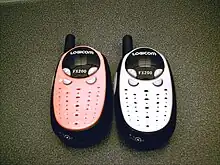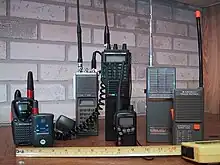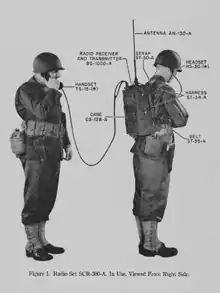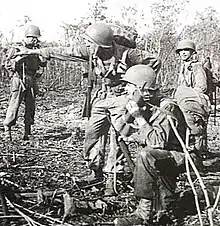Walkie-talkie
A walkie-talkie is a hand held two way radio receiver/transmitter or transceiver. It was developed in the Second World War.




Radio engineer Alfred J. Gross worked on the early technology behind the walkie-talkie between 1934 and 1941. During the war it was developed by Donald L. Hings and engineering teams at Motorola led by Henryk Magnuski.[1][2]
Typical walkie-talkies today are phone sized and have a push-to-talk button. Walkie-talkies are used for various reasons, in the military, for amateur radio, and for personal use.
History
The first walkie-talkie was so large it had to be carried in a backpack, and was called Motorola SCR-300. Motorola also made other Walkie-talkies during World War Two.[3] During World War Two The first hand-held Walkie-talkies were also developed by Motorola during WWII.[4]
Development
The idea of walkie-talkies did not get much interest until the war started in 1939. After a few years, the Motorola team had improved them so that the army could use them. There were also vehicle and tank versions.[1] The British, Germans, and Americans all had their own versions.
Motorola also produced the hand-held AM SCR-536 radio during World War II, and it was called the "handie-talkie" (HT).[4] The terms are often confused today, but the original walkie talkie referred to the back mounted model, while the handie-talkie was the device which could be held entirely in the hand (but had vastly reduced range).
Uses
Walkie-talkies are widely used in many settings, including business, police force, military, and recreation.
References
- Donald L. Hings, inventor & telecommunications pioneer Walkie Talkie
- The history of the Walkie talkie
- Radio set SCR-300 – A War Department technical manual TM 11-242
- Wolinsky, Howard (2023-08-21). "Riding radio waves for 93 years, Motorola milestones". Walkie-Talkies.net. Archived from the original on 21 August 2023. Retrieved 21 August 2023.